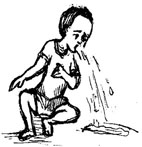Symptoms and signs of cholera
Knowledge of the typical symptoms and signs of cholera will help you to suspect cases and undertake further epidemic investigation measures. Cholera usually manifests after an incubation period of one to five days (i.e. the time between the bacteria entering the person's body and the first symptoms appearing), but it can begin within a few hours after the infection. In about 80% of cases, the disease presents with relatively mild symptoms, but about 20% develop acute watery diarrhoea with severe sudden onset. The stools are painless and voluminous, with the appearance of water in which rice has been boiled (rice-water stools are a characteristic sign of cholera). The patient also experiences nausea, vomiting (figure below), fever and rapid progression to experiencing extreme weakness and shock. In such cases, death may occur within hours after the start of the illness.

Shock in cholera results from rapid dehydration and loss of essential salts in the voluminous diarrhoea and vomit. The signs are the same in shock due to severe dehydration caused by cholera.
What are the typical signs of shock in an adult patient?
The typical signs of shock are systolic blood pressure dropping below 90 mmHg and/or diastolic blood pressure dropping below 60 mmHg, with a rapid pulse rate above 100 beats per minute. A person in shock will often appear confused and may lose consciousness. You must act quickly to save their life.
If you see a person with the characteristic symptoms and signs of cholera, you must manage the patient immediately and begin effective control measures in the community. The risk of a cholera epidemic developing from a single case is high, so you must also undertake epidemic investigation and management procedures.
Suppose you were called to see an adult with acute watery diarrhoea and profuse vomiting of two days' duration. What other evidence would suggest a diagnosis of cholera in this person?
In addition to the rapid onset and progression of the illness, the following symptoms and signs would support the diagnosis of cholera:
- Painless diarrhoea and rice-water appearance of his stool
- Fever
- Extreme weakness
- Shock (low blood pressure and rapid pulse rate)
- Similar cases in the household or nearby.